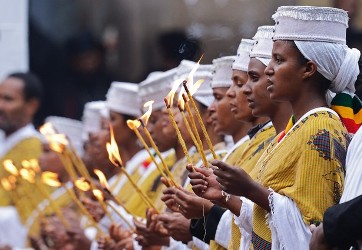Saudi Arabia sought to portray case of detained Ethiopians as an immigration issue: cable
June 21, 2015 (KHARTOUM) – The Saudi government was concerned that the case of 35 Ethiopians detained by authorities would be viewed as one that is religiously motivated, a cable from the Saudi foreign ministry reveals.

The Saudi embassy in Washington also received inquiries on this issue from unspecified external parties and asked for guidance.
The detained group was comprised of six men and 29 women practicing their faith at a house in the coastal city of Jeddah, the cable explains.
The cable asserts that “after interrogating them, there was nothing that indicated them propagating or spreading their faith”.
The investigator in the case recommended shelving the case and referring them to immigration in preparation for deportation proceedings.
The cable recommends that “in light of Saudi Arabia’s public position on allowing non-Muslims to practice their faith in their own residence without making it public” that the case be characterized as an immigration issue “due to the lack of appropriate terminologies used by the investigating authority”.
It also recommended a response to be used when addressing this issue for the external audience.
“Freedom to practice religious rituals for non-Muslims living on the territory of the kingdom is guaranteed by the regulations in their private homes and residences and no one can interfere in the affairs of their individual worship or force them to abandon their beliefs. If something happened otherwise then it is an single case (for which the perpetrator is held accountable) that does not represent the internal policies in dealing with these matters”.
“What was published on the internet with reports on the Ethiopians arrested in Safa neighborhood carried incorrect news and information about the incident, as the aforementioned entered the kingdom and were present illegally and violating residency systems with the exception of 10 people who harbored the rest illegally, and that the competent authority in the kingdom (Directorate General of Passports) are dealing with their case in accordance with the residency statute”.
The Ethiopians were eventually deported in August 2012 after accusations of them being verbally and physically assaulted by Saudi authorities.
The women were subjected to strip searches and the men beaten and called “unbelievers”, according to Human Rights Watch (HRW).
They said that they have been charged with mixing with unmarried persons of the opposite sex.
(ST)
